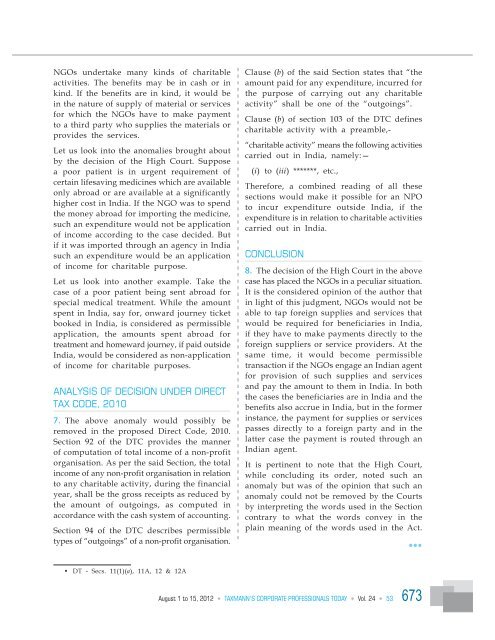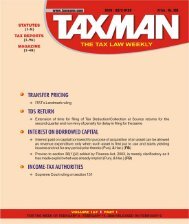CPT V24P7-Art1 (Content).pmd - Taxmann
CPT V24P7-Art1 (Content).pmd - Taxmann
CPT V24P7-Art1 (Content).pmd - Taxmann
Create successful ePaper yourself
Turn your PDF publications into a flip-book with our unique Google optimized e-Paper software.
NGOs undertake many kinds of charitable<br />
activities. The benefits may be in cash or in<br />
kind. If the benefits are in kind, it would be<br />
in the nature of supply of material or services<br />
for which the NGOs have to make payment<br />
to a third party who supplies the materials or<br />
provides the services.<br />
Let us look into the anomalies brought about<br />
by the decision of the High Court. Suppose<br />
a poor patient is in urgent requirement of<br />
certain lifesaving medicines which are available<br />
only abroad or are available at a significantly<br />
higher cost in India. If the NGO was to spend<br />
the money abroad for importing the medicine,<br />
such an expenditure would not be application<br />
of income according to the case decided. But<br />
if it was imported through an agency in India<br />
such an expenditure would be an application<br />
of income for charitable purpose.<br />
Let us look into another example. Take the<br />
case of a poor patient being sent abroad for<br />
special medical treatment. While the amount<br />
spent in India, say for, onward journey ticket<br />
booked in India, is considered as permissible<br />
application, the amounts spent abroad for<br />
treatment and homeward journey, if paid outside<br />
India, would be considered as non-application<br />
of income for charitable purposes.<br />
ANALYSIS OF DECISION UNDER DIRECT<br />
TAX CODE, 2010<br />
7. The above anomaly would possibly be<br />
removed in the proposed Direct Code, 2010.<br />
Section 92 of the DTC provides the manner<br />
of computation of total income of a non-profit<br />
organisation. As per the said Section, the total<br />
income of any non-profit organisation in relation<br />
to any charitable activity, during the financial<br />
year, shall be the gross receipts as reduced by<br />
the amount of outgoings, as computed in<br />
accordance with the cash system of accounting.<br />
Section 94 of the DTC describes permissible<br />
types of “outgoings” of a non-profit organisation.<br />
• DT - Secs. 11(1)(a), 11A, 12 & 12A<br />
Clause (b) of the said Section states that “the<br />
amount paid for any expenditure, incurred for<br />
the purpose of carrying out any charitable<br />
activity” shall be one of the “outgoings”.<br />
Clause (b) of section 103 of the DTC defines<br />
charitable activity with a preamble,-<br />
“charitable activity” means the following activities<br />
carried out in India, namely:—<br />
(i) to (iii) *******, etc.,<br />
Therefore, a combined reading of all these<br />
sections would make it possible for an NPO<br />
to incur expenditure outside India, if the<br />
expenditure is in relation to charitable activities<br />
carried out in India.<br />
CONCLUSION<br />
8. The decision of the High Court in the above<br />
case has placed the NGOs in a peculiar situation.<br />
It is the considered opinion of the author that<br />
in light of this judgment, NGOs would not be<br />
able to tap foreign supplies and services that<br />
would be required for beneficiaries in India,<br />
if they have to make payments directly to the<br />
foreign suppliers or service providers. At the<br />
same time, it would become permissible<br />
transaction if the NGOs engage an Indian agent<br />
for provision of such supplies and services<br />
and pay the amount to them in India. In both<br />
the cases the beneficiaries are in India and the<br />
benefits also accrue in India, but in the former<br />
instance, the payment for supplies or services<br />
passes directly to a foreign party and in the<br />
latter case the payment is routed through an<br />
Indian agent.<br />
It is pertinent to note that the High Court,<br />
while concluding its order, noted such an<br />
anomaly but was of the opinion that such an<br />
anomaly could not be removed by the Courts<br />
by interpreting the words used in the Section<br />
contrary to what the words convey in the<br />
plain meaning of the words used in the Act.<br />
August 1 to 15, 2012 u TAXMANN’S CORPORATE PROFESSIONALS TODAY u Vol. 24 u 53<br />
•••<br />
673











![“FORM NO. 3CEB [See rule 10E] Report from an ... - Taxmann](https://img.yumpu.com/45480232/1/190x245/form-no-3ceb-see-rule-10e-report-from-an-taxmann.jpg?quality=85)





